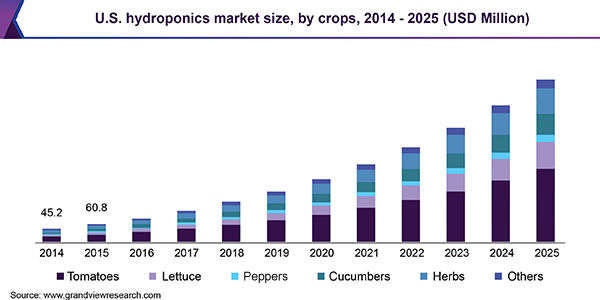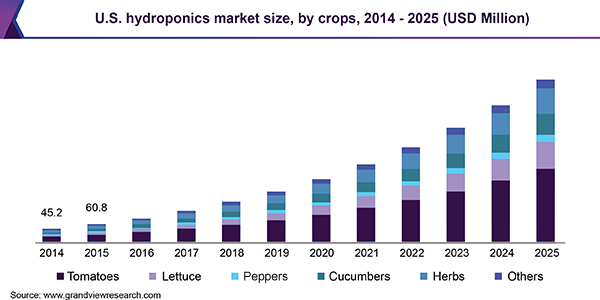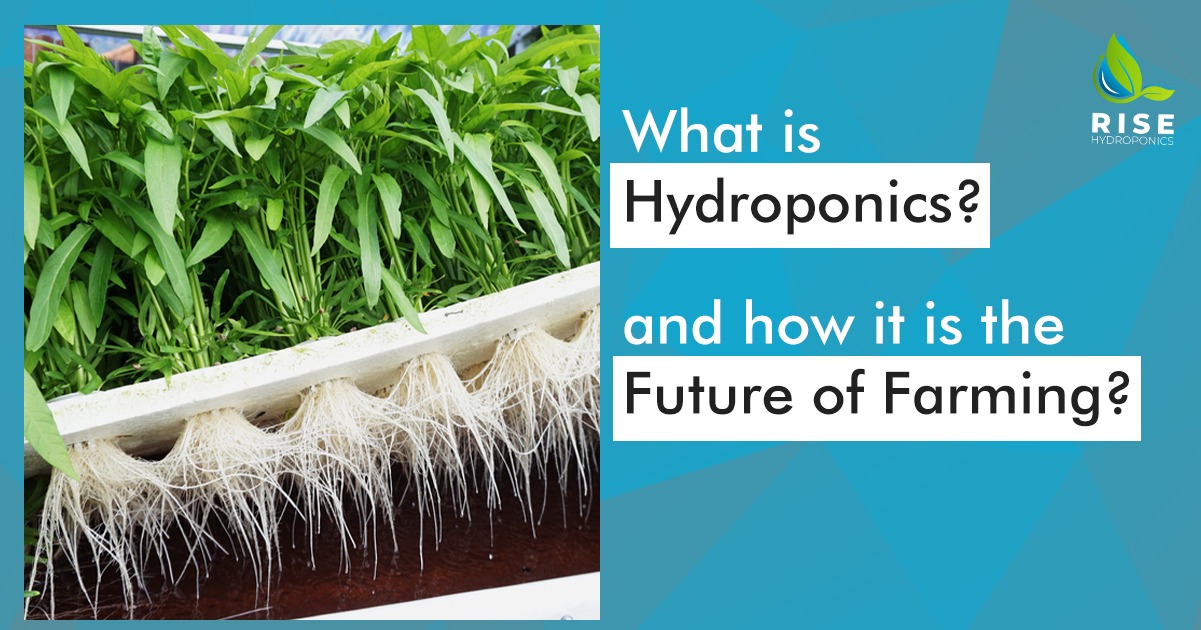What if you didn’t have a fertile farm? Could you still grow plants without soil? Probably not. But all thanks to Hydroponics farming, this seemingly impossible process is slowly becoming a part of regular farming.
But what is Hydroponics farming? And why is it suddenly so popular around the world? We have all the answers you’re looking for. Read on to understand more about growing plants hydroponically.
How are Plants Grown Hydroponically?
Hydroponics farming simply means growing plants in nutrient-rich water. This might sound unusual. But here’s how it is done:

Why is Hydroponics Farming the Future of Agriculture?

As per the above figure, during 2018, its market size was valued at USD 1.33 billion/ And this is expected to grow at a CAGR of 22.52% by 2025. Also, the Hydroponics market has been segmented into cucumber, tomato, lettuce, pepper, herbs, and others (cannabis, berries, fruits, and leafy vegetables). Tomato covers more than 30 per cent of the total market share.
All the developed and developing countries hold a significant market share, which will continue to grow. TWith a rapidly growing population, the demand for food is also increasing. Conventional farming methods have failed to match this growing demand. This is because over time, as the same soil is used to grow crops, again and again, it turns infertile. Other climatic and logistical issues also often destroy the produce.his makes Hydroponics the fastest growing food cultivation method.
Reasons for this tremendous growth of Hydroponics farming

Reduces dependence on nature
What if your living region has no natural conditions to support a particular crop? Your region’s soil might not be rich enough or of the right type for specific plants. What if the weather turns dreary, preventing you from farming? In India’s Western Ghats region in January 2021, farmers suffered heavy losses due to unexpected rainfall. Hydroponics farming has a solution for all such constraints.
As Hydroponics farming provides artificial nutrients, climate or region don’t affect your choice of crop. This comes in handy, especially considering the varying climate conditions of India. And with global warming turning nature more and more unpredictable, the Hydroponics technique is a true blessing for farmers.
Can feed a large population
With a rapidly growing population, the demand for food is also increasing. Conventional farming methods have failed to match this growing demand. This is because over time, as the same soil is used to grow crops, again and again, it turns infertile. Other climatic and logistical issues also often destroy the produce.

But Hydroponics farming alleviates those issues. There’s no soil, so the question of it turning infertile due to repeated planting is moot. And since Hydroponics plants depend little on external climatic conditions, you can have plenty of produce at all times. Also, according to the UN, plants in the Hydroponics system have a 20-25% higher yield than those in conventional farming. Hydroponics farming, therefore, can surely meet rising demands all year round.
Fewer Pests
One of the biggest headaches for a farmer is saving his crop from pests. Irrespective of the seed quality, no crop can grow well without pest control. The problem doesn’t end there. Even if you run pest control, they return. Pests alone damage 30-35% of the annual crop yield in India (ICAR).
Hydroponics has an inbuilt solution for this. As it’s done in a neutral environment, the possibility of pests is significantly less. No pests usually survive on root-support mediums used in Hydroponics. So the number of pests that can plague a Hydroponics garden is far less than those that plague the soil. Lack of pests makes sures that the crop is of better quality.
Saves water
Thousands across India lack access to drinking water. So we absolutely can’t afford to waste it. But unfortunately, in India, agriculture uses more than 80% of the surface water. It’s time for our farming to become water-efficient too. Thankfully, with Hydroponics farming, there is a glimmer of hope.

Hydroponics farming is focused on providing nutrients through water. A medium like clay can retain moisture to a large extent. So the use of water reduces automatically. Moreover, a closed Hydroponics system guarantees little to no evaporation. All the water used in Hydroponics farming is recycled, resulting in minimal water wastage.
Space-efficient
The reason farmers need large land spaces is that plants can’t be too close to each other. Plants’ roots need to spread afar to absorb water and nutrients from the soil. But in a world already suffocating due to lack of open space, such traditional farming increases trouble.
Hydroponically grown plants don’t spread their roots because they have all the nutrients they need in their spot. In such a system, therefore, more plants can grow in a compact space. According to the UN, Hydroponics farming increases the yield 2-5 times.
Conclusion
These benefits of Hydroponics farming make it incredibly sustainable. So as a farmer, it’s time you start looking at Hydroponics as an alternative to an inefficient, traditional farming system. Get in touch with us to learn how to get your hands on the latest Hydroponics technology and bring this revolutionary method to your home.

